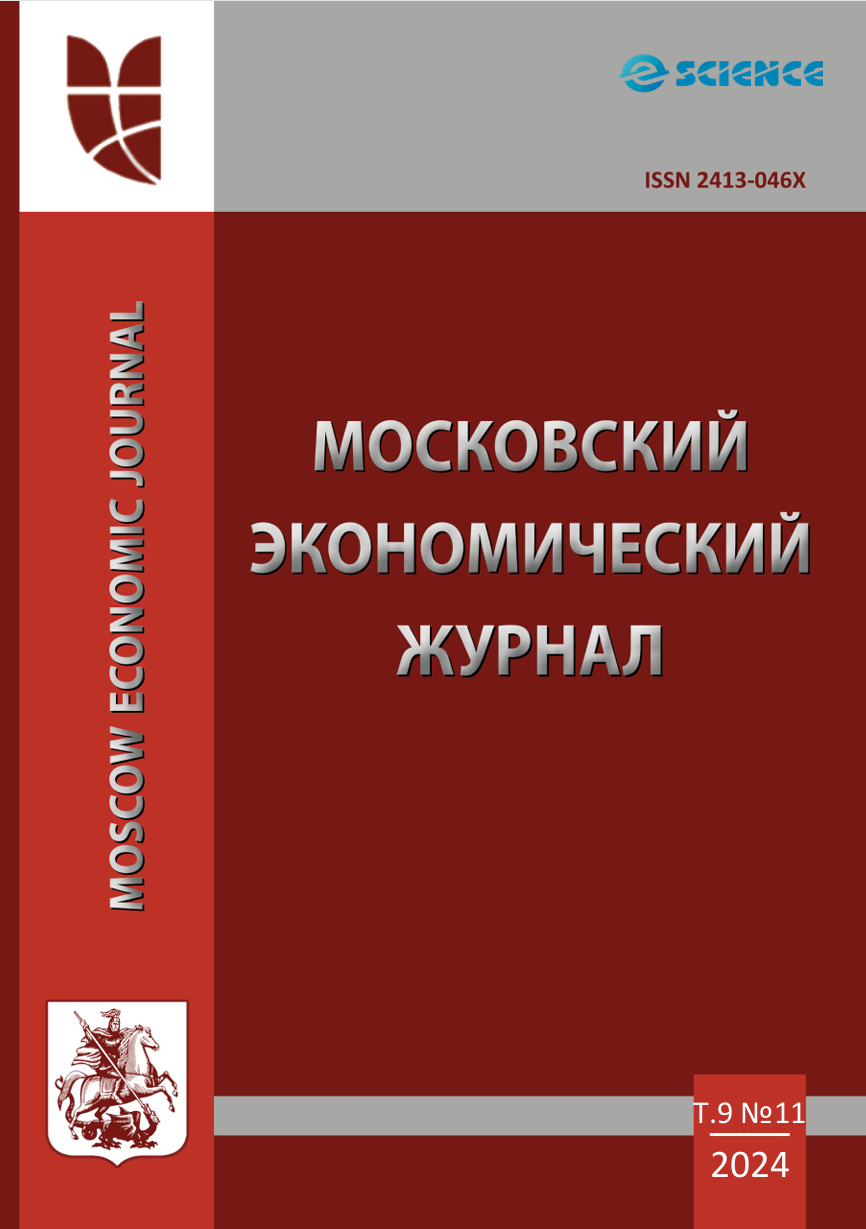Kabardino-Balkarian State University named after K.M. Berbekov (Institute of Law, Economics and Finance for Research and Innovation, Deputy Director)
Nalchik, Nalchik, Russian Federation
Karachay-Cherkess Branch of the Synergy University (Faculty of Economics, Linguistics, Social Psychology, Dean)
UDC 330
UDC 332
The article is devoted to the systematization and generalization of the main trends in the transformation of horticulture in Russia in the context of the implementation of the concept of sustainable development. Horticulture in the new realities is changing under the influence of both international and national factors of agricultural development. The digital transformation of agriculture and the intensification of the introduction of scientific and technological development achievements contributed to the development of ways and techniques to reduce the dependence of the industry on weather and climatic conditions. The article presents the results of research in the field of transformation of horticulture in the Russian Federation in the context of the implementation of the concept of sustainable development and the climate agenda. The state's climate policy and consideration of environmental aspects are reflected in all spheres of society, including horticulture. A modern garden becomes an aesthetic playground; an ecologically and climatically sustainable environment for growing plants and food that is safe for humanity.
garden, gardening, sustainable development, "green" products, environment, innovation, agriculture, trends, transformation, digital technologies, climate change, natural and climatic conditions
1. Ukaz Prezidenta Rossiyskoy Federacii ot 07.05.2024 g. № 309 O nacional'nyh celyah razvitiya Rossiyskoy Federacii na period do 2030 g. i na perspektivu do 2036 g. Oficial'nye opublikovanie pravovyh aktov // Rezhim dostupa://www.consultant.ru/document/cons_doc_LAW_475991/?ysclid=m38kyzgfy4678508583
2. Ukazom Prezidenta Rossiyskoy Federacii ot 28 fevralya 2024 g. № 145 «O Strategii nauchno-tehnologicheskogo razvitiya Rossiyskoy Federacii»
3. Valeriy Fal'kov: Razvitie dekarbonizacii nevozmozhno bez uchastiya nauki // https://vfanc.ru/valerij-falkov-razvitie-dekarbonizaczii-nevozmozhno-bez-uchastiya-nauki/
4. Velibekova L. A. Ekonomicheskie aspekty proizvodstva i potrebleniya svezhey i pererabotannoy plodovo-yagodnoy produkcii // APK: ekonomika, upravlenie. 2022. № 6. S. 72–80. DOI:https://doi.org/10.33305/226-72.
5. Gerber, Yu. B. Tehnologii intellektual'nogo analiza i prinyatiya resheniy v sadovodstve / Yu. B. Gerber, V. V. Krasovskiy // Izvestiya sel'skohozyaystvennoy nauki Tavridy. – 2024. – № 37(200). – S. 186-198. – EDN DOAPNV.
6. Itogi rossiyskogo sadovodstva v 2023 godu //https: pole.rf/journal/publication/3510?ysclid=m2k9y02p3760504755
7. Kadomceva, M. E. (2023). Koncepciya ustoychivogo razvitiya: evolyuciya teoreticheskih podhodov i sovremennoe videnie. AlterEconomics, 20(1), 166–188. https://doi.org/10.31063/AlterEconomics/2023.20-1.9
8. Kon'yunktura rynka sadov i vinogradnikov v RF. Analiz i potencial razvitiya // Ekspertno-analiticheskiy centr agrobiznesa. Rezhim dostupa: https: ab-centre.ru
9. Kopnina, T. A. Produktivnost' perspektivnyh sortov vishni (Prunus cerasus L.) v usloviyah yuzhnogo sadovodstva / T. A. Kopnina, R. Sh. Zaremuk // Agrarnyy vestnik Urala. – 2023. – T. 23, № 11. – S. 34-43. – DOIhttps://doi.org/10.32417/1997-4868-2023-23-11-34-43. – EDN JMTFDI.
10. Mishurov N. P., Kondrat'eva O. V., Fedorenko V. F., Fedorov A. D., Slin'ko O. V., Voytyuk V. A. Cifrovye sistemy i robotizirovannye tehnicheskie sredstva dlya sadovodstva: analiticheskiy obzor. Moskva: Rosinformagroteh, 2022. 80 s. 6
11. Minsel'hoz soobschil o nachale vesenney zakladki sadov v Rossii [Elektronnyy resurs]. URL: https:// tass.ru/ekonomika/14347781 (data obrascheniya: 11.11.2024).
12. Osipov A.I. Organicheskoe zemledelie: mif i real'nost' // Izvestiya Sankt-Peterburgskogo gosudarstvennogo agrarnogo universiteta. – 2022. – №2 (67). – S. 73-82 doi:https://doi.org/10.24412/2078-1318-2022-2-73-82.
13. Obzor mirovogo organicheskogo rynka i rynka Rossii na konec 2023 goda Rossii [Elektronnyy resurs]. URL: https://organicfund.ru/new/obzor-mirovogo-organicheskogo-rynka-i-rynka-rossii-na-konec-2023-goda (data obrascheniya: 11.11.2024 g.)
14. Postanovlenie Pravitel'stva Rossii «O Gosudarstvennoy programme razvitiya sel'skogo hozyaystva i regulirovaniya rynkov sel'skohozyaystvennoy produkcii, syr'ya i prodovol'stviya» ot 14.07.2012 №717 (s izm. ot 13.06.2023 №976) // Portal GARANT.RU: sayt. – URL: https://base.garant.ru/70210644/ (data obrascheniya 10.11.2024).
15. Poddubnyy, N. A. Innovacii kak osnovnoe napravlenie povysheniya effektivnosti sadovodstva i pitomnikovodstva v regione / N. A. Poddubnyy // Ekonomika, trud, upravlenie v sel'skom hozyaystve. – 2023. – № 10(104). – S. 97-106. – DOIhttps://doi.org/10.33938/2310-97. – EDN EKUVSP.
16. Rahimova E. A. Podhody k formirovaniyu koncepcii cifrovoy transformacii sadovodstva Rossiyskoy Federacii // Agrarnyy vestnik Urala. 2024. T. 24, № 03. S. 417‒429. https://doi. org/10.32417/1997-4868-2024-24-03-417-429.
17. Sadovodstvo Rossii v rastuschem trende [Elektronnyy resurs]. URL: https://www.agroxxi.ru/gazetazaschita-rastenii/zrast/sadovodstvo-rossii-v-rastuschem-trende.html (data obrascheniya: 10.11.2024).
18. Sviridova, A. D. Intensivnoe sadovodstvo: ekonomicheskie predposylki i tehnologicheskie osobennosti otrasli / A. D. Sviridova, A. E. Morozov // Ekonomika i ekologiya territorial'nyh obrazovaniy. — 2021. — T. 5, № 1. — S. 26–32, https://doi.org/10.23947/2413-1474-2021-5-1-26- 32
19. Truhachev V. I. Intensivnye tehnologii v razvitii otechestvennogo sadovodstva // Ekonomika sel'skogo hozyaystva Rossii. 2020. № 3. s. 44–47. DOI:https://doi.org/10.32651/203-44.
20. Shogencukova, Z. H. Dekarbonizacii ekonomiki: trendy razvitiya agropromyshlennogo kompleksa (APK) Rossii / Z.H. Shogencukova, K.A. Sundukova // International Agricultural Journal. – 2023. – T. 66, № 6. – DOIhttps://doi.org/10.55186/25876740_2023_7_6_33. – EDN IYCHYQ.
21. Scheglov, E. V. Plodohranilischa - sovremennyy trend v otrasli Sadovodstvo / E. V. Scheglov, S. V. Nikitenko, S. V. Fomina // Ekonomicheskie issledovaniya i razrabotki. – 2023. – № 6. – S. 95-99. – EDN JSJHAK.
22. A Srisis Unequality. Switching power on New eco-social contract. URL: https://cdn.unrisd.org/assets/ library/reports/preview-unrisd-flagship-report-2022.pdf (data obrascheniya: 09.11.2024).
23. Zhang M., Jin Y., Zheng F., Qiao H. Product quality asymmetry and food safety: Investigating the “one farm household, two production systems” of fruit and vegetable farmers in China // China Economic Review. 2017. Vol. 45, No. 9. Pp. 232–243. DOI:https://doi.org/10.1016/j.chieco.2017.07.009.
24. Dhiman P., Kaur A., Hamid Y., Alabdulkreem E., Elmannai H., Ababneh N. Smart Disease Detection System for Citrus Fruits Using Deep Learning with Edge Computing // Sustainability. 2023. Vol. 15, Iss. 5. Article number 4576. DOI:https://doi.org/10.3390/su15054576.
25. Bacco M., Barsocchi P., Ferro E., Gotta A., Ruggeri M. The Digitisation of Agriculture: a Survey of Research Activities on Smart Farming // Array. 2019. Vol. 3–4. DOI:https://doi.org/10.1016/j.array.2019.100009.
26. Shogentsukova, Z. Digital aspects of management of the agro-industrial complex of Russia / Z. Shogentsukova, A. Shogentsukov // E3S Web of Conferences, Yekaterinburg, 15–16 oktyabrya 2020 goda. – Yekaterinburg, 2020. – P. 01019. – DOIhttps://doi.org/10.1051/e3sconf/202022201012. – EDN ZDBXTC.











